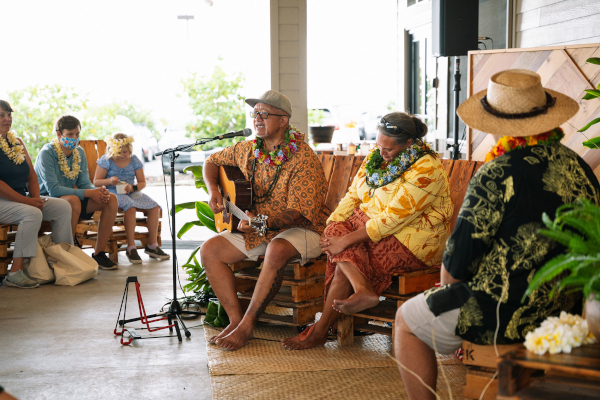Making Hawaiian Culture a Conversation and a Way of Life
A Kealakehe community center is making Native Hawaiian cultural practices accessible to all with the ‘Ola ka Lāhui event series.
 Native Hawaiian navigators Chad “Onohi” Paishon and Pomai Bertelmann at a recent ‘Ola ka Lāhui event in June.
Native Hawaiian navigators Chad “Onohi” Paishon and Pomai Bertelmann at a recent ‘Ola ka Lāhui event in June.
Photo courtesy of Michelle Mishina
On a summer Saturday afternoon in Kailua-Kona, a few dozen people have gathered under an open pavilion to hear something special: Longtime Native Hawaiian navigators Chad “Onohi” Paishon and Pomai Bertelmann sharing their thoughts and experiences gained over decades of sailing on traditional vessels, including the original Hōkūle‘a.
From hearing about their early childhood experiences to hearing a performance of “Wa‘a Kaulua,” a mele written for the Hōkūle‘a’s maiden voyage in 1976, the audience is rapt. Paishon tells the story of their 2019 voyage on the Makali‘i, in which they were able to sail from Hawai‘i Island to the Northwestern Islands of Papahānaumokuākea and back, provisioned only with food grown on Hawai‘i Island.
“We’ve come to realize that the success of the canoes is directly related to the success of our community,” Paishon says. “These things are not a metaphor for us. If we can feed 16 people on the deck of a canoe for a month, and have them healthy and thriving, why can’t we put these foods in our house and feed our families?”
This conversation is part of the event series ‘Ola ka Lāhui (The Nation Lives On), put on by La‘i‘ōpua 2020, a community center in the Kealakehe Hawaiian Home Lands of Kailua-Kona led by executive director Kawehi Inaba. Each event features Native Hawaiian cultural practitioners sharing their expertise, and attendees can also participate in a range of traditional activities such as lei making, lauhala weaving, and pounding pa‘i ‘ai (undiluted taro).
La‘i‘ōpua project director Tamar deFries says the series is intended to share and celebrate the best of Native Hawaiian expertise in a direct, personal way, not only with other Hawaiians but with the larger community and visitors. “We all have gifts and talents, whether it’s navigating a canoe, or drying aku as a fisherman,” she says. “Through these talk story sessions, we have a space to share and be a part of this in our own unique way.”
The ‘Ola ka Lāhui event series is being funded by the Hawai‘i Tourism Authority through its Kūkulu Ola: Living Hawaiian Culture Program, supporting Island programs that perpetuate Hawaiian culture and community.
Kēhau Meyer of the Hawai‘i Community Foundation, which administers the Kūkulu Ola program, says, “There’s intrinsic value in investing in indigenous practices, and supporting cultural practitioners as essential members of our community. These programs reinvest into people and place, which are the two most valued and special things that make Hawai‘i Hawai‘i.”
One of the goals of ‘Ola ka Lāhui, deFries says, is to evolve away from the old model of performer/audience.
“Events like this create a personal, meaningful relationship,” she says. “When you look around at the audience, there are Native Hawaiians, there are locals and there are visitors, getting a chance to see this from this intimate perspective. It’s a whole different lens.”
Read more Stories of Impact